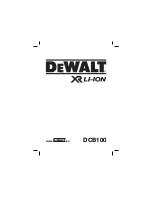
Operating Instructions
2
01825E
FAILURE TO DO SO MAY CAUSE CHARGER
FAILURE OR IMPROPER OPERATION.
CAUTION: NEVER USE THE CHARGER IN
A BATTERY TRAY THAT DOES NOT HAVE
SUITABLE VENTILATION HOLES.
To place the charger into the charger
compartment of the battery tray, lift the charger by
grasping the charger handle to a position directly
above the charger compartment. Slowly lower the
charger into the charger compartment of the
battery tray.
If necessary, place corrugated spacers, the type
used when mounting battery cells into the tray,
between the sides and cover of the charger and
the battery tray walls in order to fill up empty
space in the compartment between the charger
and the tray.
CAUTION: DO NOT BLOCK CHARGER
VENTILATION HOLES WITH A SPACER.
WARNING: TO REDUCE THE RISK OF
FIRE, DO NOT USE CHARGER NEAR
FLAMMABLE MATERIALS OR VAPORS.
GROUNDING INSTRUCTIONS
This battery charger must be grounded to reduce
the risk of electric shock. It is equipped with an
electric cord having an equipment-grounding
conductor and a grounding-type plug. The plug
must be plugged into an appropriate outlet,
supplied with a
ground fault interrupter
, that is
properly installed and grounded in accordance
with the National Electrical Code and all codes
and ordinances.
DANGER: IMPROPER CONNECTION OF
THE EQUIPMENT-GROUNDING CONDUCTOR
CAN RESULT IN A RISK OF ELECTRIC
SHOCK. DO NOT REMOVE GROUNDING
PRONG FROM PLUG.
This battery charger is equipped with a grounding
plug as illustrated in Figure A, for use on a
nominal 120 volt, 60 Hertz circuit. A temporary
adapter, as illustrated in Figures B and C, may be
used if a properly grounded outlet is not available.
The temporary adapter should be used only until a
properly grounded outlet can be installed by a
qualified electrician. The green-colored rigid ear
extending from the adapter must be connected to
a permanent ground such as a properly grounded
outlet box.
GROUNDING METHODS
NOTE: Use of an adapter screw as shown in
Figures B and C is not permitted in
Canada.
DANGER: BEFORE USING THE ADAPTER
AS ILLUSTRATED, BE CERTAIN THAT THE
CENTER SCREW OF THE OUTLET PLATE IS
GROUNDED.
NORMAL OPERATION
Instructions printed on cover of charger are for
daily reference.
1. Connect the power supply cord to a properly
grounded, 120 volt, 60 Hertz single-phase
outlet. The RED AC "ON" indicator will glow,
indicating AC power is present.
CAUTION: MAKE SURE THE BATTERY
PACK IS A 24-VOLT, 12-CELL, SERIES
CONNECTED, 150-225 AMP-HOUR (6 HR.
RATE), RECHARGEABLE DEEP-CYCLE
BATTERY SYSTEM.
DANGER: TO PREVENT ELECTRIC
SHOCK, DO NOT TOUCH BATTERY
TERMINALS. MAKE SURE ALL ELECTRICAL
CONNECTORS THAT ARE CRACKED,
CORRODED OR DO NOT MAKE ADEQUATE
ELECTRICAL CONTACT ARE REPLACED
IMMEDIATELY. USE OF A DAMAGED OR
DEFECTIVE CONNECTOR MAY RESULT IN A
RISK OF OVERHEATING OR ELECTRIC
SHOCK.
2. The ammeter needle may bounce initially and
the transformer should hum slightly.
3. Charger will turn ON one to three (1-3)
seconds after completion of the last of the
above actions, and the charger ammeter will
indicate initial charge current.
























